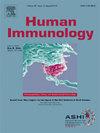Association of methylenetetrahydrofolate reductase (MTHFR) C677T, MTHFR A1298C, and CYP3A4 A290G gene polymorphisms with clinical outcomes of HLA-matched sibling allogeneic hematopoietic cell transplantation in an Egyptian patient/donor cohort
IF 3.1
4区 医学
Q3 IMMUNOLOGY
引用次数: 0
Abstract
The impact of non-HLA drug-metabolizing gene polymorphisms on post-transplant outcomes is well recognized. We aimed to evaluate the impact of 5,10-methylenetetrahydrofolate reductase (MTHFR) C677T and A1982C and CYP3A4 A290G polymorphisms on the outcomes of patients undergoing allogeneic hematopoietic stem cell transplantation (HSCT) from fully matched siblings. Using PCR-RFLP and according to DNA availability, MTHFR and CYP3A4-V polymorphisms were evaluated. In total 60 patient/donor pairs were investigated. The MTHFR genotypes exhibited similar frequencies in both patients and donors; the MTHFR wild-type in patients correlated with a trend towards reduced incidence of GVHD and improved overall survival rates. Most patients (84.9 %) and donors (76.8 %) had CYP3A4 A wild type. Acute GVHD occurred only in patients with the wild type (10/45 AA vs 0/8 AG or GG) and 9/43 vs 1/13 in recipients from donors with AA vs. AG + GG. GVHD prophylaxis regimens that do not include methotrexate demonstrated a 5.5-fold increased risk of acute GVHD (p = 0.03). Alternative conditioning regimens to Busulphan/Cyclophosphamide exhibited a 19.1-fold increase in the risk of transplant-related mortality (TRM), with statistical significance (p = 0.007). Severe oral mucositis was correlated with male gender (p = 0.03) and a diagnosis of leukaemia (p = 0.007). Renal toxicity is correlated with an age of ≥ 18 years (p = 0.04) and male gender (p = 0.04). In conclusion, methotrexate in GVHD prophylaxis correlates with a reduced risk of GVHD, while the Busulphan/Cyclophosphamide conditioning regimen is linked to a lower incidence of TRM. Although statistical significance was not achieved due to the predominance of the CYP3A4 wild type, its nearly exclusive association with GVHD may hold clinical significance. Therefore, genotyping patients and adjusting the CsA dose for individuals with the CYP3A4 wild type is recommended.
求助全文
约1分钟内获得全文
求助全文
来源期刊

Human Immunology
医学-免疫学
CiteScore
5.40
自引率
7.40%
发文量
107
审稿时长
12 days
期刊介绍:
The journal''s scope includes understanding the genetic and functional mechanisms that distinguish human individuals in their immune responses to allografts, pregnancy, infections or vaccines as well as the immune responses that lead to autoimmunity, allergy or drug hypersensitivity. It also includes examining the distribution of the genes controlling these responses in populations.
Research areas include:
Studies of the genetics, genomics, polymorphism, evolution, and population distribution of immune-related genes
Studies of the expression, structure and function of the products of immune-related genes
Immunogenetics of susceptibility to infectious and autoimmune disease, and allergy
The role of the immune-related genes in hematopoietic stem cell, solid organ, and vascularized composite allograft transplant
Histocompatibility studies including alloantibodies, epitope definition, and T cell alloreactivity
Studies of immunologic tolerance and pregnancy
T cell, B cell, NK and regulatory cell functions, particularly related to subjects within the journal''s scope
Pharmacogenomics and vaccine development in the context of immune-related genes
Human Immunology considers immune-related genes to include those encoding classical and non-classical HLA, KIR, MIC, minor histocompatibility antigens (mHAg), immunoglobulins, TCR, BCR, proteins involved in antigen processing and presentation, complement, Fc receptors, chemokines and cytokines. Other immune-related genes may be considered.
Human Immunology is also interested in bioinformatics of immune-related genes and organizational topics impacting laboratory processes, organ allocation, clinical strategies, and registries related to autoimmunity and transplantation.
 求助内容:
求助内容: 应助结果提醒方式:
应助结果提醒方式:


